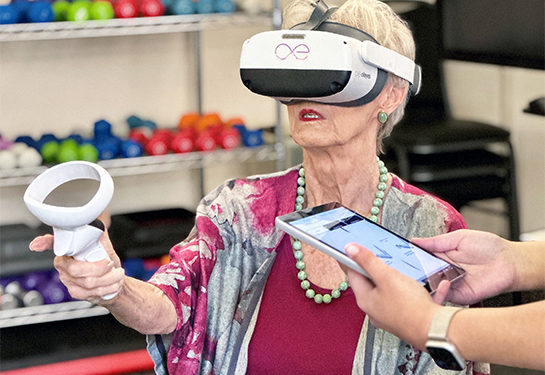Demyelinating Diseases
Demyelinating diseases injure myelin, which is the protective covering around nerve cells. These injured nerves can cause symptoms throughout the body. Our team, led by specialized neurologists, supports you with expertise and compassion throughout your treatment.
Medically reviewed by Vaishnavi Vaidyanathan, M.D. on June 17, 2025.

What Are Demyelinating Diseases?
Demyelinating diseases affect tissues (myelin) that form an insulating layer around nerve fibers in nerve cells. Myelin helps signals travel quickly from one nerve cell to another. Nerve cells make up the nervous system — your brain, spinal cord, and nerves throughout your body.
Demyelinating diseases damage myelin, or the cells that create myelin. These diseases cause problems with nerve cell communication and lead to cell degeneration over time.
We offer specialized care for demyelinating diseases at UC Davis Health in our Department of Neurology. You can also find expert care for multiple sclerosis (MS) – the most common demyelinating disease – in our Multiple Sclerosis Clinic. We bring together multiple specialists to support your nervous system’s health as much as possible.
Types of Demyelinating Diseases
There are a variety of demyelinating diseases. Many of these types also have subtypes or rarer variants.
Some affect the nerves in your brain and spinal cord, called your central nervous system. Others affect the nerves in your body beyond your brain and spinal cord, called your peripheral nervous system.
The most common demyelinating diseases include:
- Multiple sclerosis: Most common of these diseases. It can affect all body systems with variable symptoms. Diagnosis is based on an abnormal MRI of the brain.
- Myelin oligodendrocyte glycoprotein antibody associated disease (MOGAD): Seen more in children, often can involve the eyes and spinal cord, caused by an antibody against MOG.
- Neuromyelitis optica (Devic’s disease): Causes the immune system to attack the optic nerve, brain stem, and spinal cord.
- Optic neuritis: Inflammation of the optic which relays signals from the eye to the brain.
- Transverse myelitis: Inflammation of the spinal cord.
- Acute disseminated encephalomyelitis (ADEM): A form of demyelinating disease that causes seizures and confusion. It can potentially be a precursor to the diseases described above.
- Autoimmune encephalitis: Inflammation of the brain that leads to abnormal behaviors, seizures, and other symptoms.
We also evaluate and treat other rare disorders in our clinic, including neurosarcoidosis, Behcet's disease, central nervous system (CNS) vasculitis, and many more.
Symptoms of Demyelinating Diseases
Demyelinating diseases can cause a range of symptoms depending on the type of disease. Please seek medical care if you experience any of these symptoms lasting longer than 24 hours.
Possible Symptoms
Symptoms of demyelinating diseases may include:
- Vision changes, such as blurriness, double vision, or vision loss
- Balance and coordination issues
- Stiff or weak muscles
- Movement problems, such as difficulty walking or sudden, uncontrolled movements
- Sensory changes, such as numbness, tingling, itching, or pain
- Intense bouts of vertigo
- Bladder and bowel problems, such as frequent urination, incontinence, or constipation
- Sexual challenges or dysfunction
Potential Triggers of Demyelinating Diseases
With many demyelinating diseases, your body’s immune system attacks myelin or the cells that create myelin. But what causes this autoimmune response is not always known. Additionally, causes often differ for each disease.
Diagnostic Testing for Demyelinating Diseases
We offer in-depth testing for demyelinating diseases. You can rely on our team of neurologists, neuro-ophthalmologists, and radiologists for an accurate diagnosis.
Our team of subspecialists use an array of tests to diagnose demyelinating disease and gauge response to treatment. They include:
MRI
Magnetic resonance imaging (MRI) uses magnetic fields (not radiation) to create pictures of the inside of the body.
Lumbar puncture (LP) or spinal tap
LP is a procedure that collects the fluid around the brain and spinal cord to test for signs of inflammation.
Lab testing
Regular lab testing is necessary to safely administer medications. It’s also used to rule out other conditions that have similar symptoms.
Visual testing
Formal testing of the visual system can be important for people with demyelinating conditions. Some commonly performed tests include visual field testing, optical coherence tomography (OCT), and visual evoked potentials.
Cognitive testing
This can help people with impaired cognitive tasks, including memory, attention, language, mood, etc.
Bladder studies
Bladder problems can be common in people with MS and related conditions. Demyelinating diseases can often affect the pathways that control the muscles of the bladder.
Evoked potential testing
Testing of the visual, sensory, or auditory systems can help determine if messages are getting through the pathways of the nervous system.
Treatment and Management of Demyelinating Diseases
You can find advanced and specialized treatment for many types of demyelinating diseases at UC Davis Health. Our compassionate team is here for you and your loved ones through every challenge. Your treatment plan may include:
Disease Modifying Therapy (DMT)
DMTs work to decrease the frequency of relapses and MRI brain lesion activity.
Symptomatic Treatment
Demyelinating diseases can lead to a variety of symptoms that affect the entire body. Your neurologist may prescribe medications that help improve your abilities, comfort, and quality of life.
Pain Management
Many patients with demyelinating diseases are affected by pain. Our clinic supports the first pain program in the country, specifically for patients with demyelinating diseases.
Rehabilitation Services
We provide comprehensive support to improve your quality of life with a demyelinating disease. Our expert rehabilitation team of physical medicine and rehab providers and physical, occupational, and speech therapists helps you manage and cope with symptoms.
Who does MS affect?
1MPeople in the U.S. live with MS
Source: National Multiple Sclerosis Society: MS Prevalence
Request an Appointment
As Sacramento's No. 1 hospital, you'll benefit from unique advantages in primary care and specialty care. This includes prevention, diagnosis and treatment options from experts in 150 specialties.
Referring Physicians
To refer a patient, submit an electronic referral form or call.
800-4-UCDAVIS
Patients
Call to make an appointment.
Consumer Resource Center
800-2-UCDAVIS

Ranked among the nation’s best hospitals
A U.S. News & World Report best hospital in cardiology, heart & vascular surgery, diabetes & endocrinology, ENT, geriatrics, neurology & neurosurgery, and pulmonology & lung surgery.

Ranked among the nation’s best children’s hospitals
U.S. News & World Report ranked UC Davis Children’s Hospital among the best in pediatric nephrology, orthopedics*, and pulmonology & lung surgery. (*Together with Shriners Children’s Northern California)

Ranked Sacramento’s #1 hospital
Ranked Sacramento’s #1 hospital by U.S. News, and high-performing in aortic valve surgery, back surgery (spinal fusion), COPD, colon cancer surgery, diabetes, gynecological cancer surgery, heart arrhythmia, heart failure, kidney failure, leukemia, lymphoma & myeloma, lung cancer surgery, pacemaker implantation, pneumonia, prostate cancer surgery, stroke, TAVR, cancer, orthopedics, gastroenterology & GI surgery, and urology.

The nation’s highest nursing honor
UC Davis Medical Center has received Magnet® recognition, the nation’s highest honor for nursing excellence.

World-class cancer care
One of ~59 U.S. cancer centers designated “comprehensive” by the National Cancer Institute.

A leader in health care equality
For the 13th consecutive year, UC Davis Medical Center has been recognized as an LGBTQ+ Healthcare Equality Leader by the educational arm of America’s largest civil rights organization.

